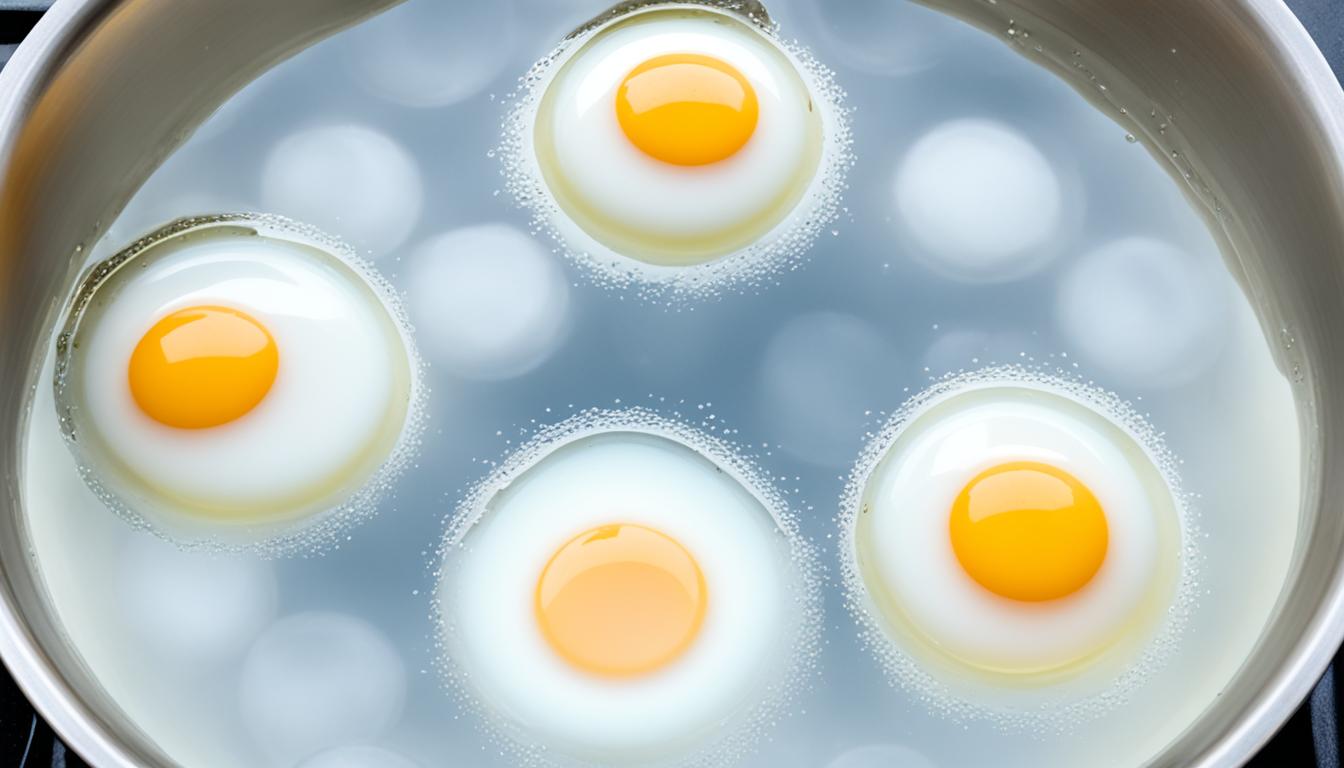Hard-boiled eggs are common in many homes. They’re eaten as snacks, tossed in salads, or part of breakfast. The question of how to tell if they’re fully cooked has many answers. A widely held belief is that an egg is cooked if it floats. But is this accurate? Let’s uncover the reality of this idea and look at how to truly know when hard-boiled eggs are ready.
Key Takeaways:
- The float test, where you place an egg in water to check if it floats, is not always reliable in determining if a hard-boiled egg is done.
- Other factors, such as egg freshness and air cell size, can influence the results of the float test.
- There are alternative methods, including shaking the eggs, inspecting them visually, and using the sniff test, that can help determine egg doneness.
- Following proper cooking techniques and using a timer is the best way to ensure perfectly cooked hard-boiled eggs.
- Egg freshness is important in achieving the desired texture and taste of hard-boiled eggs.
How to Check if Hard Boiled Eggs Are Done: The Float Test
The float test is a common way to see if eggs are cooked. If an egg floats, some say it’s done. Yet, this may not be true all the time. The egg’s age and the air cell size matter too. It’s key to know the float test might not always tell you everything.
To try the egg float test, do these:
- Fill a bowl or a glass with water.
- Gently place the egg into the water.
- See if the egg floats or sinks.
Some think if an egg floats, it’s cooked. If it sinks, it might not be. But remember, there’s more to it than just floating or sinking.
“The float test can help guess if an egg is cooked. But it’s not always right. Egg age and air cell size also matter.”
Floating eggs might be overcooked or just old. Sinking eggs could need more cooking. So, it’s smart to use the float test with other checks. This helps make sure your eggs are cooked just right.
Now, let’s look at other ways to check if hard-boiled eggs are cooked. These methods can give you a clearer picture.
Other Methods to Determine Egg Doneness
Checking if hard-boiled eggs are done is easy with the float test, but there are other ways. These other techniques might not give clear-cut answers. Yet, they help you know if your eggs are cooked just right.
Shaking the Eggs
A simple trick is to gently shake the eggs. If they sound solid, they’re probably cooked through. But a sloshing sound might mean they’re still raw inside.
Submerging in Warm Water
Try putting the eggs in warm water to see air bubbles. If bubbles come out of the shell in a bowl of warm water, your eggs are likely done. Remember, this method might not always work right, especially with newly boiled eggs.
Shining a Light through the Shell
Using a flashlight can also help check the eggs. Shine a light on the shell and look for clear or slightly opaque spots. These spots can show if the egg needs more cooking. But, be careful not to heat the eggs too much with the light.
These other ways can give you more clues about whether your eggs are cooked. Still, they might not be as reliable as using a timer or watching the eggs. It’s best to use a mix of these methods to get your hard-boiled eggs just perfect.
| Method | Pros | Cons |
|---|---|---|
| Float Test | – Quick and easy – Provides some indication of egg freshness |
– Not always accurate for determining doneness |
| Shaking the Eggs | – Simple and requires no additional tools | – Results may vary and can be subjective |
| Submerging in Warm Water | – Can reveal air bubbles, indicating cooked eggs | – Results may not be consistent |
| Shining a Light through the Shell | – Provides a more detailed assessment | – Requires a flashlight or light source |
The Best Way to Cook Hard-Boiled Eggs
For perfect hard-boiled eggs, use a timer and a specific method. Here is an easy guide to follow:
- Gather your ingredients: Large eggs, saucepan, water.
- Place the eggs: Put the eggs in one layer in a saucepan.
- Add water: Make sure the eggs are under water.
- Heat the water: Heat the water on the stove until it boils.
- Reduce heat: When it boils, lower the heat to simmer.
- Cooking duration: Set a timer. Cooking for 9-12 minutes makes fully cooked eggs.
- Cool and peel: Move the eggs to cold water or an ice bath to cool. This makes peeling easier.
- Peel and enjoy: Crack the shell by tapping the eggs on a hard surface, then peel them. Your eggs are ready!
This way, you get the same results every time, preventing over or undercooked eggs. These eggs are great for salads, sandwiches, or just by themselves.
Note: Change the cooking time to get the yolk you like. Cook less for a softer yolk, more for a firmer one.
The Importance of Egg Freshness
Freshness is key when cooking with eggs. It affects the taste, texture, and how they cook.
Fresh eggs have a tiny air cell, making a difference in cooking. This small air space affects how the egg floats during tests for doneness.
Older eggs have a bigger air cell. As eggs age, this air space increases. It may cause them to float, even if they’re not done. This could mislead you during the float test.
Knowing about egg freshness helps in the kitchen. While many use the float test for hard-boiled eggs, consider how old the eggs are. This will make your cooking results more reliable.
Using fresh eggs can improve the overall quality of your dishes and ensure a more accurate assessment of doneness when using methods like the float test.
To visually demonstrate the impact of egg freshness on the float test, take a look at the following table:
| Egg Freshness | Floating Test Result |
|---|---|
| Fresh eggs | Sink |
| Older eggs | Float |
Using the Expiration Date as a Guide
The expiration date on the egg carton tells you about the eggs’ freshness. It suggests when the eggs should be eaten for the best quality. Still, eggs can be okay to eat weeks after this date if you kept them in the fridge.
Understanding Egg Expiration Dates
Egg cartons have an expiration or pack date. This guides you on the eggs’ freshness and quality. It tells you when to eat the eggs for the best taste and texture.
The date considers when the eggs were laid and their shelf life. Remember, expiration dates are not always precise and can differ by brand.
Deciphering Egg Carton Dates
The expiration date is on the egg carton’s short side. It shows the month, day, and year. For instance, “12/04/2023” means eat the eggs by December 4, 2023.
Some cartons also show a pack date. This tells you when the eggs were put into the carton. It helps you know how fresh the eggs are, especially as the expiration date gets closer.
Using the Expiration Date Wisely
It’s vital to look at the expiration date, but eggs can be fine to eat after it. This date is just a freshness guide, not a spoilage alert.
If eggs are past their expiration date, check them carefully. Look for cracks or bad smells. Fresh eggs will have a clean shell and no foul odor.
“Eggs can still be good to eat for several weeks after the expiration date, especially if they have been properly stored in the refrigerator.”
Proper Egg Storage
Store your eggs right to keep them fresh as long as possible. Keep them in their carton in the fridge. The cold slows down bacteria, keeping eggs fresh.
Don’t put eggs on the fridge door—it’s warmer there. Also, keep them away from strong-smelling foods. Eggs can pick up those odors.
Understanding Egg Expiration Dates
| Expiration Date Format | Meaning |
|---|---|
| MM/DD/YYYY | The eggs are recommended for consumption until the specified date. |
The Sniff Test and Visual Inspection
The sniff test and visual inspection can quickly tell if an egg is good. Bad eggs smell awful, but fresh eggs don’t smell at all. Also, look for cracks or a slimy shell, which mean bacteria or mold might be present.
To do the sniff test, just hold the egg near your nose and sniff gently. A fresh egg will smell neutral or a bit earthy. A bad smell means the egg is spoiled. Trusting your nose can keep you safe from sickening eggs.
Looking closely at the egg shell is also smart. Check for any cracks or sliminess. A damaged egg could let bacteria inside. Also, a slimy or powdery shell indicates harmful bacteria or mold. It’s safest to throw such eggs away.
But remember, the sniff test and checking the egg’s look aren’t perfect. If you’re unsure about an egg, it’s better to not use it.
Avoiding Contaminated Eggs
Keeping eggs safe starts with how you handle and store them. Always put eggs in the fridge right away. Keep them cold at 40°F or colder. Storing eggs in their carton helps protect them and reminds you of their expiration date.
Before and after touching eggs, wash your hands. This keeps them clean. Always use clean tools and areas when working with eggs. Don’t use eggs that are cracked or have been out of the fridge for over two hours because these could be contaminated.
“The sniff test and visual inspection are simple yet effective ways to determine if an egg is still good.”
| Signs of a Fresh Egg | Signs of a Spoiled Egg |
|---|---|
| No smell | Foul odor |
| Crack-free shell | Cracked or leaking shell |
| No slime or powdery appearance | Slime or powdery film on the shell |
The Float Test Revisited
The float test isn’t always right for checking if hard-boiled eggs are done. But, it’s good for telling if eggs are fresh. As eggs get older, the air cell inside grows, making them float. If an egg sinks, it’s probably fresher than those that float.
To do the float test, follow these steps:
- Fill a bowl or glass with enough water to fully submerge the egg.
- Gently place the egg into the water.
- Observe the egg’s behavior:
If the egg sinks to the bottom and lays flat on its side, it is likely fresh and suitable for consumption.
If the egg stands upright on one end at the bottom of the container, it is still safe to eat but not as fresh.
If the egg floats to the surface, it is not fresh and should be discarded.
Don’t just rely on the float test. Use the sniff test and look at the egg too, for better results on egg freshness.
Comparison of Egg Freshness Based on Float Test Results
| Egg Behavior in Water | Egg Freshness |
|---|---|
| Sinks to the bottom and lays flat | Fresh |
| Stands upright at the bottom | Still safe to eat but not as fresh |
| Floats to the surface | Not fresh, discard |
The float test gives a basic idea of how fresh your hard-boiled eggs are. But remember, the best way to keep eggs safe to eat is by storing them right. Use them within a good amount of time. If you’re not sure about an egg’s freshness, it’s best to throw it out.
Conclusion
It’s a myth that eggs float when perfectly boiled. In fact, freshness and air inside affect floating. So, the float test might not always tell you if an egg is done.
To make sure your eggs are boiled right, use a few methods together. Try the float test, smell them, look them over, and cook them well. Checking egg freshness with the float test, sniffing for bad smells, and looking for weirdness helps. Plus, cooking them right is key.
Finding the perfect way to boil eggs takes some trying. Mix different techniques and cooking times till you get them just how you like. With some practice, you’ll nail making tasty hard-boiled eggs every time. Enjoy the great feeling of cooking eggs just right!





